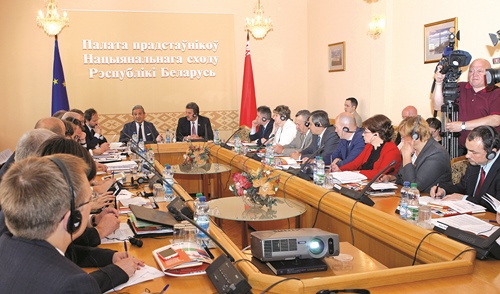The Council was established as a result of a decision by CIS Heads of State, on March 28th, 1997. It promotes co-operation in the fight against international organised crime and other co-ordinated illegal activities. In addition, it supports the unification of CIS states’ national legislation, developing laws to govern international co-operation between special services. It works to apply the decisions of CIS heads of state on issues relating to special service competence and unites security bodies and special service heads of nine states: Armenia, Azerbaijan, Belarus, Kazakhstan, Kyrgyzstan, Moldova, Russia, Tajikistan and Ukraine. Turkmenistan and Uzbekistan participate as observers.

Security issues in the limelight
This year, Belarus hosted the anniversary session of the CIS Council of Heads of Security Agencies and Special Services. According to Mr. Lukashenko, this has given the opportunity to discuss topical issues for the CIS, namely the situation in Trans-Dniester, Nagorny Karabakh and Ukraine.
The President has emphasised that the CIS needs to promote dialogue on this and other topics. He underlined, “We need to find agreement. We’ll have to, because we’re in the same boat. We aren’t particularly welcome on other shores. We need to make life better here.” In his opinion, CIS nations share a similar mentality, as is helpful. “We know each other and know how to make life better here,” he is convinced. The President added that CIS countries are aware of the real threat posed by the deteriorating migration situation in Europe, the growing crisis in the world economy, and the increasing fight for energy, water, and other resources. “This provides fertile ground for radical extremism. Threats from international terrorist organisations are multiplying. Such issues as transnational crimes, illegal drug trade and human trafficking are also on the agenda.” All impose special responsibility on state security agencies and upon special services of CIS member states.
Mr. Lukashenko has underlined the importance of developing the CIS as a unique integration and negotiation platform. It is also necessary to step up efforts to modernise the Commonwealth, making it stronger and more attractive for member states, while adapting it to modern realities. “I’m convinced that, one of these days, Ukraine will come to us. The country has a great number of interests here. I think Georgia will do the same,” the President said. “We should get them back. There are too many people over there who are ready to co-operate with us.”
According to the Belarusian Head of State, much has been done since the Commonwealth was established. As an example, he mentioned the CIS free trade zone. When Ukraine lost access to the zone, the country incurred huge losses. Great efforts have been made for citizens, allowing them to move freely across the former Soviet Union and take employment in CIS member states. “There are no major barriers. It’s necessary to preserve and develop this, so that people treasure the Commonwealth of Independent States.”
Mr. Lukashenko stressed that the Commonwealth now faces new challenges, which need solidarity and joint response. “Unfortunately, the zone of instability around us is expanding. We have to acknowledge that the mechanisms of ensuring international and regional security are eroding. Certain external political forces are returning to the bloc, recalling the Cold War period. Attempts to draw vast regions into conflict and a new arms race are obvious. This is absolutely inadmissible,” he emphasised.
By Alexander Pimenov











